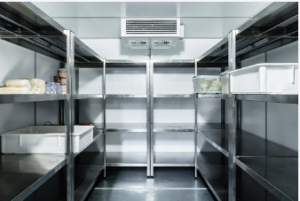Industrial refrigeration systems are essential to many industries, from food processing to construction. However, the entire process could be at risk without adequate temperature regulation.
These industrial refrigeration Adelaide systems consume much effort and are essential to any business’ success. Therefore, it is crucial to comprehend their operation and how best to utilise them efficiently.
Refrigeration for Electricity
Industrial refrigeration Adelaide takes heat from a low-temperature medium (like water) and transfers it to a higher-temperature medium (such as ice). Historically, this energy transfer was driven by mechanical means but may also be fuelled by electricity or other forms of electromagnetic radiation.
 Electricity can power a refrigerator by running the motor of an AC unit or fridge, which then compresses gas (usually Freon) before it expands. Once cooled, this Freon cools whatever it’s connected to – like an AC unit or fridge – for cooling purposes.
Electricity can power a refrigerator by running the motor of an AC unit or fridge, which then compresses gas (usually Freon) before it expands. Once cooled, this Freon cools whatever it’s connected to – like an AC unit or fridge – for cooling purposes.
This type of cooling is the most widespread and efficient; it’s one reason why electricity has become such a staple for refrigeration applications and is a significant power source in many homes today.
Refrigerators typically consume very little energy, so controlling their usage can save you money on energy bills and help the environment at the same time. You can take several steps to enhance the efficiency of your refrigeration system, such as regular maintenance and using measures like PCM thermal energy storage.
Refrigeration for Maintenance
Industrial refrigeration Adelaide units must be regularly serviced, repaired, or replaced to keep them running optimally, protecting food products. Doing this helps avoid product loss and repair/replacement expenses associated with malfunctioning equipment.
Regular inspections and maintenance for commercial refrigeration equipment will significantly extend its life, reduce energy costs, and ensure peak efficiency in operation.
One of the essential parts to maintain on your refrigeration equipment is the condenser coil. If these become clogged with dust and debris, they won’t be able to effectively remove heat from the refrigerant, forcing your compressor to work harder than necessary.
Regularly cleaning the coils on your refrigerator can extend its life and reduce repair and replacement expenses. Use a vacuum cleaner or air compressor to loosen any build-up of dirt or debris blocking the coils.
Refrigeration for Food
Industrial refrigeration is used in the food industry to maintain foodstuffs at a low temperature to extend shelf life, protect from microbiological contamination and slow spoilage. Refrigeration also helps preserve nutritional quality by lowering product temperatures, which prevents water loss, flavour loss, colour change or texture changes.
Refrigeration is also helpful in maintaining the temperature of products during transportation and distribution, which is essential when transporting food to stores or restaurants. When shipping temperature-sensitive items like milk, fish, meat or vegetables, keeping them at a low temperature for safe delivery is essential.
Cold storage is a large area where food is chilled for extended periods. These facilities often sit near slaughterhouses, fishing centres, gardens and other establishments where raw materials are processed before being transported for consumption.
Retail refrigerators are large insulated cabinets that use electric compressors to move liquid (refrigerant) around cooling bars and reduce air inside, keeping food cool and fresh. These units can often be found in supermarkets, where they help showcase various food and drink items without compromising their quality or freshness.
Other industrial applications for refrigeration include manufacturing, which utilises it to liquefy gases and keep specific processes running at their required low temperatures. For example, metal forming uses refrigerant to lower steel’s temperature, while chemical plants and oil refineries use it to cool chemicals and gases. Compressed air purification also uses it to liquefy and condense water vapour to reduce moisture content in compressed air.
Refrigeration for Pharmaceuticals
The pharmaceutical industry relies heavily on refrigeration systems that maintain precise temperatures in rooms and storage units. Many production processes involve biological or biochemical reactions that must take place under controlled conditions, often at low temperatures.
Due to these factors, the pharmaceutical industry must have high-quality and dependable refrigeration systems. It holds especially true regarding raw materials, intermediates, and finished products – all essential in producing drugs and medicines.
Raw materials that must be kept at the correct temperature can be damaged or destroyed if not controlled, leading to safety issues and financial losses for the company. That is why companies often opt for industrial refrigeration instead of household models.






Comments are closed, but trackbacks and pingbacks are open.